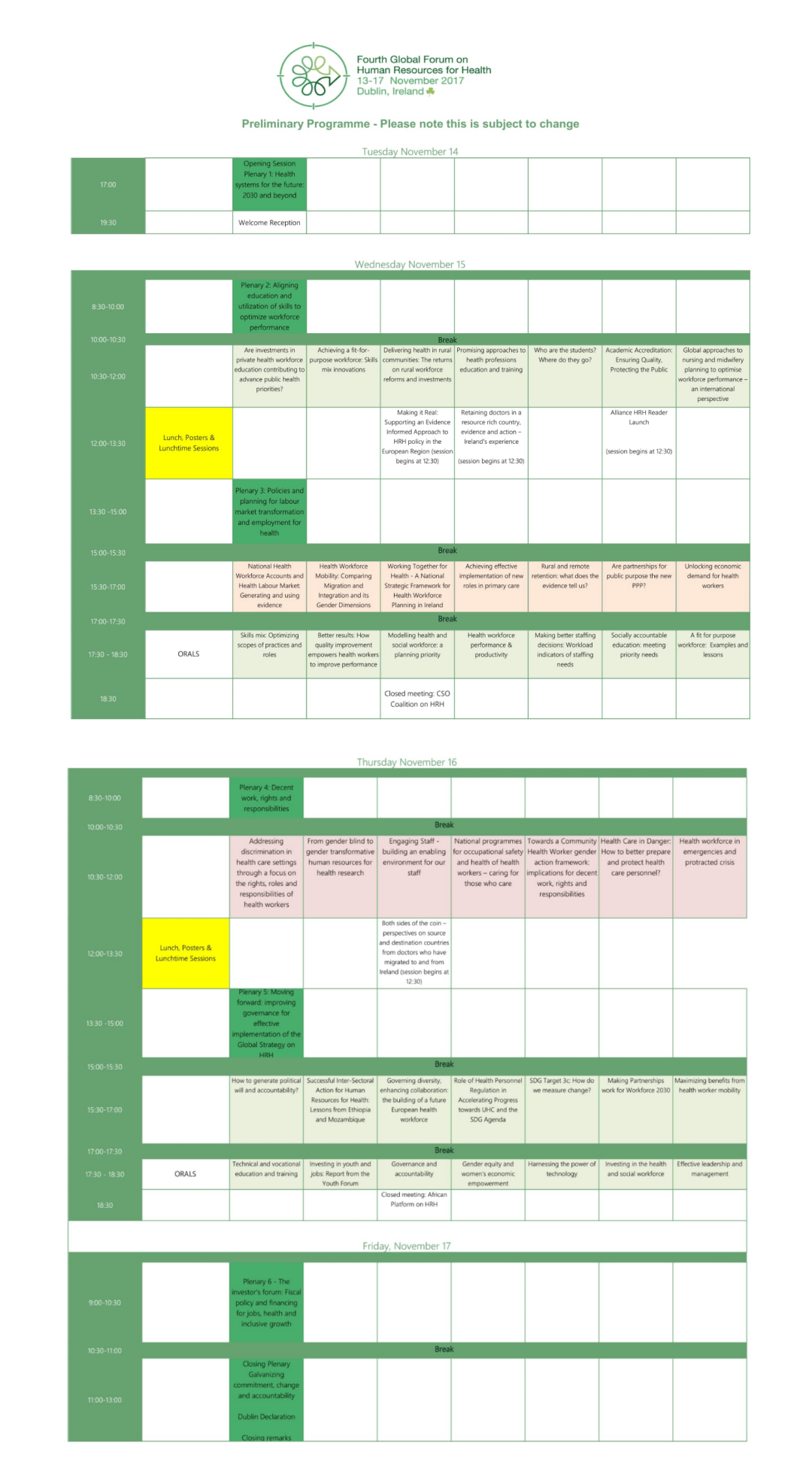Forum Programme
13-17 November 2017 Royal Dublin Society, Dublin, Ireland
Main Forum Programme
The theme of the Forum is Building the health workforce of the future
The Forum consists of six plenaries in total, four of which are immediately followed by six parallel track sessions, which explore specific aspects of this theme in more depth.
The track sessions are of two types:
1) Health workforce policy and practice
2) Research and innovations
Programme at glance

Free transportation will be provided by "This is Living" driving and mobility non-profit organization
The organized sessions, selected based on a call for submission process, are built around 4 subthemes:
Sub-theme 1:
Aligning education and utilization of skills to optimize workforce performance
Subtheme 1 focuses on optimizing workforce performance to meet population health needs through scaling-up high quality education and life-long learning, ensuring a proper skill mix of health workers and distribution (geographical, among sectors and across levels of the health system) to match population health needs, and enabling them to work to their full potential. It is about planning and ensuring the right skills for the right jobs in the right places.
Submissions are expected to cover (but are not limited to): transformative education, technical and vocational education and training (TVET); continuing education and skills maintenance and anticipation; workforce competencies, skills mix, behaviour and scopes of practice, including competencies for and implications of specific thematic priorities (International Health Regulations; antimicrobial resistance; RMNCAH; HIV/ AIDS; other infectious diseases; NCDs; diversity, gender and respectful care training; immunization programmes); emerging professions and alternative cadres of workforce groups particularly in low-income settings; social accountability, recruitment and retention in underserved areas and sectors of activity (e.g. mental health, public health, geriatrics, global surgery); expansion of the private education market, role and responsibilities of the private sector in workforce education and accreditation mechanisms, the use of innovative delivery models and technologies among others.
Sub-theme 2:
Policies and planning for labour market transformation and employment for health
Subtheme 2 focuses on evidence-informed policies and reforms to address labour market challenges as well as actions to stimulate investments in creating employment opportunities that respond to the current and future needs of the population to achieve UHC, health security and the SDGs.
Submissions are expected to cover (but are not limited to): health labour market analysis, matching health workforce supply to population needs, health workforce planning and implementation, forecasting and modelling, workforce performance and productivity, dual practice, social and economic benefits of health employment, migration and labour mobility, demographic and epidemiological changes including the ageing workforce, and innovative ways of meeting increasing demand for the health workforce.
Sub-theme 3:
Decent work, rights and responsibilities
Subtheme 3 covers policies, actions and investments to ensure decent work for all jobs across the health economy. Decent work involves opportunities for work that is productive and delivers a fair income, security in the workplace and social protection for families, better prospects for personal development and social integration, freedom for people to express their concerns, organize and participate in the decisions that affect their working lives and equality of opportunity and treatment for all women and men.
Submissions are expected to cover (but are not limited to): productive employment, creating attractive health sector jobs particularly for women and youth, rights at work, social protection and social dialogue, employment relations, working conditions including remuneration, incentives, job security, occupational health and safety, protection of health workers from violence and attacks, labour relations, effective recognition and application of labour rights and enabling and supportive human resource management practices.
Sub-theme 4 :
Moving forward: improving governance for effective implementation of the Global Strategy on HRH
Subtheme 4 addresses governance actions (at global, regional, national and local levels), that are needed for the development and transformation of health systems and the workforce to progress towards UHC and SDGs.
Submissions are expected to cover (but are not limited to): The implementation of the WHO Global Code of Practice on the International Recruitment of Health Personnel, national HRH governance structures; recruitment, training and retention strategies; the development, negotiation and review of workforce strategies including inter-sectoral policy dialogue and social dialogue, voice and accountability, decision-making processes, laws and regulations, institutions and institutional reforms, health professions councils; engagement with the private sector, information and intelligence for decision-making and local governance issues.
Fourth Global Forum on Human Resources for Health
Day(s)
:
Hour(s)
:
Minute(s)
:
Second(s)
